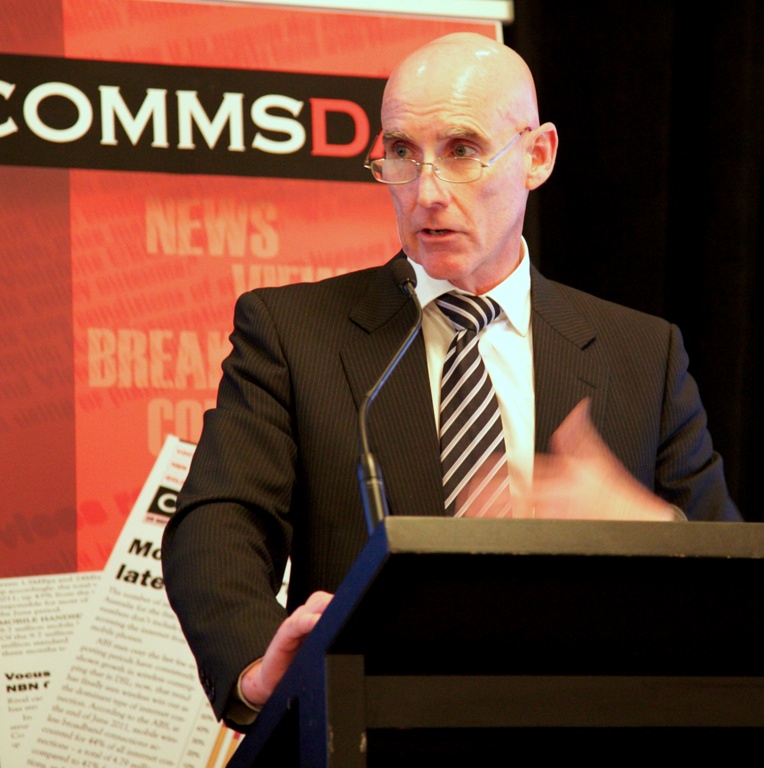NBN Co CEO tests waters for broadband study

NBN Co CEO Mike Quigley has signalled support for a Communications Alliance-led study into the different potential broadband rollouts in Australia, to help inform what he said has become a "serious debate" over the National Broadband Network (NBN) project.
In a wide-ranging speech delivered at an American Chamber of Commerce lunch in Sydney on Friday, Quigley went through the pros and cons of the different sorts of technologies that are currently being debated in the public arena ahead of the 2013 federal election: fibre to the premises (FttP), fibre to the node (FttN), hybrid fibre-coaxial (HFC), fixed wireless, and satellite.
He said it is good that the country is having a debate on the best technological method of delivering telecommunications infrastructure in Australia. He said that such a debate should be led by industry group the Communications Alliance, of which NBN Co sits on the board with a number of other telecommunications companies.
"The telecommunications industry itself is uniquely well placed to provide valuable context to policy choices and their impacts on this industry and its customers," he said.
"It is for this reason that NBN Co welcomes and supports a study that is being considered by the Communications Alliance into the potential pros and cons of a range of policy and technology options and their future impact on the National Broadband Network."
Quigley told journalists after the event that he had approached the Comms Alliance with the idea a number of weeks ago, and that it is still in the process of consideration.
"It's very important in making these big decisions that the industry speaks up," he said.
"I wouldn't say it is too late. The decision the elected government of the day made is to build a future network for the next 50, 60, 70 years. The fact that that is debated now, and it is a serious debate, I think says, if it is really a serious debate ... then it is time [for] the industry to facilitate that."
Quigley said he would expect such a study to be completed within the next few months.
"I think what would happen is you'd get the issues on the table in a transparent and open way," he said. "Decisions are made based on good data and facts."
But the proposal has already come under fire from Australia's second largest telco, and Comms Alliance member Optus, with the company's vice president of corporate and regulatory affairs David Epstein saying it should be left to individual companies to debate the various technologies.
"Optus believes a public debate regarding various broadband technologies is best left for individual companies to contribute to rather than a Comms Alliance review," he said in a statement.
Shadow Communications Minister Malcolm Turnbull, who is in favour of an FttN rollout in many places, has frequently criticised the government for not undertaking a formal cost-benefit analysis to determine the best technology for Australia. Although the Comms Alliance has not indicated whether this study would be a thorough cost-benefit analysis, Quigley said that NBN Co would offer to make all financial information it could available to the study.
"We've offered to make any information available, and we're doing that progressively except for two conditions. One: Where it is really commercially sensitive information, in other words where we have contracts or we know that in two years' time, we're going to renew contracts, and the cost for that particular contract, if we put it in the public domain, it would frankly prejudice our ongoing negotiations. Or we don't yet have [a] sufficient sample size to be confident we can say this is what we had in the corporate plan, this is now what we're experiencing on the basis of what we're doing," he said.
NBN Co would also make its view known. Quigley told journalists that NBN Co, for example, didn't consider buying Telstra's copper access network from the company, because it would be difficult to come in as a third-party provider and separate out Telstra's existing network.
"This is why you need the industry opining on these issues," he said.
"You can't just say 'let's buy the copper'. It's not that easy. It's bloody difficult."
Turnbull has an open invitation to meet with Quigley, but the shadow minister must follow protocol for speaking with an employee of a government business enterprise, and organise the meeting through the minister. Quigley said that outside of the joint parliamentary committee on the NBN, he has not met with Turnbull, but said he is open to such a meeting.
"We will talk to anybody who would like to talk to us," he said.
